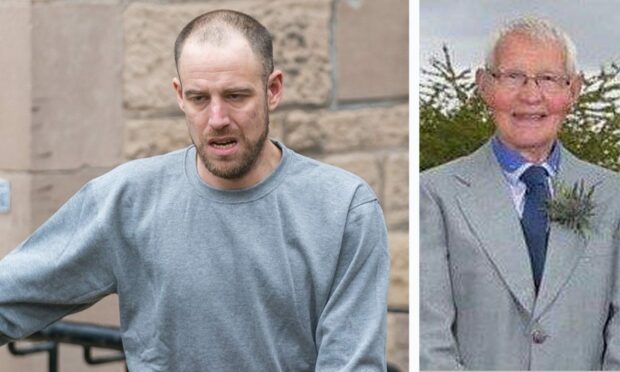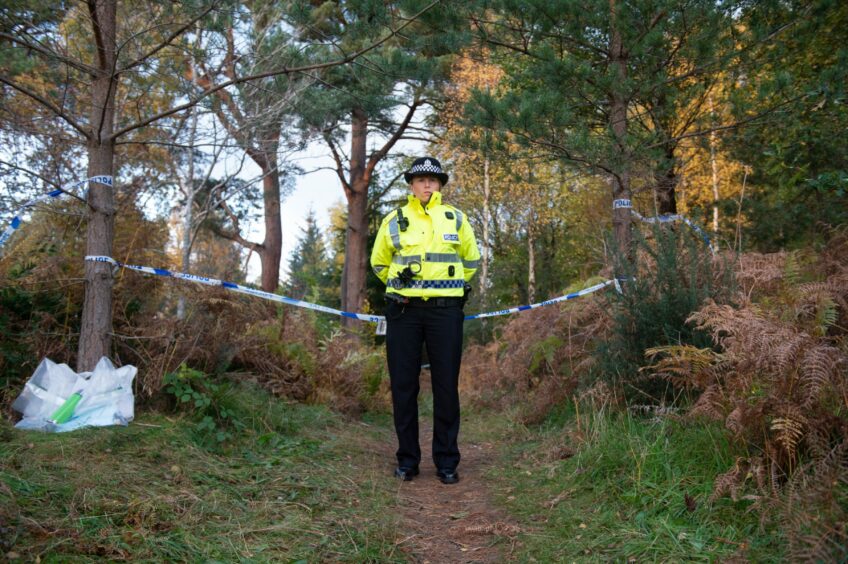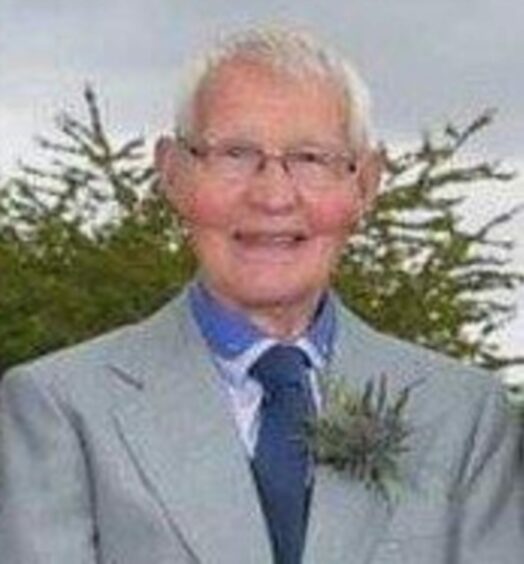Medics may have placed an “inappropriate onus” on a psychotic man to “essentially self-medicate” his own mental health care, a fatal accident inquiry has been told.
David Johnstone was suffering from a severe psychotic disorder when he killed 83-year-old Frank Kinnis and attacked two others in October 2019 – around four months after he met a GP regarding his increasingly unusual behaviour.
A fatal accident inquiry at Elgin Sheriff Court is this week examining the health care Mr Johnstone received in the weeks and months before the tragedy.
The inquiry has previously heard that when Mr Johnstone told GP Dr Kerry Cattanach about his hallucinations and concerns in June 2019 he did not meet the criteria to be detained under the Mental Health Act.
Dr Cattanach did, however, make an “urgent referral” to a mental health specialist at Dr Gray’s Hospital in Elgin – an appointment that Mr Johnstone ultimately failed to attend.
Court heard extent of delusions
The Crown’s expert witness, consultant psychiatrist for NHS Tayside Dr Gary Stevenson, said that Mr Johnstone may have been too unwell to comprehend the seriousness of his condition.
Giving evidence today, Dr Stevenson said people with symptoms like Mr Johnstone’s might have “a detachment from reality that means they may not accept they have any mental health issues and are therefore unlikely to respond to any offers of help”.
The second and final day of the inquiry heard how a referral letter sent from Mr Johnstone’s GP to the specialist psychiatrist made mention of Mr Johnstone suffering “hallucinations and seeing energy in his mind”.
That letter said that the then 36-year-old spoke “enthusiastically and at length” about “seeing things in great detail”, and believing “energy was colliding and falling out”.
He also said he was “seeing things from the computer’s point of view” and “struggling to make decisions and questioning algorithms behind computer systems at work”.
Dr Stevenson said that given Mr Johnstone’s symptoms, further action and discussion should have been “triggered” when he missed his appointment slot one week after his GP’s home visit.
“But the onus would have been on secondary care services to deal with the situation,” Dr Stevenson said.
“The issue here was that while he may not have been an immediate danger I don’t think there was any updated information. The only information they had was from the initial assessment from the GP.”
He added: “There’s an indication he might struggle to identify that he was suffering from mental ill health.”
‘An unfair onus’
Doctors’ notes stated Mr Johnstone appeared “happy” to engage with mental health service – although Dr Stevenson said that should not necessarily be taken at face value.
“When confronted, someone with a mental disorder will sometimes placidly comply in order to get the GP or psychiatrist out of the house,” he added.
He wrote in his report about the case: “The expectation that a person with a psychotic disorder would attend an appointment as an outpatient appears to place an inappropriate onus on the patient.”
Evidence from another expert witness, Dr Guy Krauth, an Edinburgh GP, suggested that the chances of Mr Johnstone accepting his appointment invitation and indeed a further invite to reengage with his GP were “in fairness fairly slim” given his previous non-engagement.
Cleared on medical grounds
On the first day of the inquiry, the court heard how Mr Johnstone felt his life changed three years before the incident when “his life and mind sped up faster than light and he struggled to keep up”.
After his family raised concerns about his mental health he was visited by his GP and agreed to engage with psychiatric services.
But four months on – and after he failed to respond to a letter to attend a professional mental health assessment – he went on to kill Mr Kinnis and attack two others.
Mr Johnstone was later charged with murdering Mr Kinnis at Linkwood Farm, Barmuckity, Elgin. He was also charged with attempting to murder Morris and Janette Smith, both 70, on the same day at Birkenhill Woods, Elgin.
Mr Johnstone was acquitted of murdering the pensioner in July 2020 after pleading not guilty on the grounds of a mental disorder that meant he was unable to appreciate the nature or wrongfulness of his actions.
The Crown accepted that plea and in October a judge ruled that Mr Johnstone be detained at the State Hospital at Carstairs for an “unlimited” period of time in order to protect the public.
Closing submissions
In her closing submission, fiscal depute Lixia Sun said: “Mr Johnstone was effectively left to self-manage his own care because there was no reason to think he would not engage in his own time and because there was family involvement.
“An assertive outreach support should have been provided and a visit by a psychiatric outreach team may have been appropriate.”
She added evidence also suggested a “specific issue of concern” was that “maybe unrealistic expectation that he take responsibility for his own engagement”.
Advocate Ayla Iridag, representing NHS Highlands said: “Mr Johnstone’s assault on Mr Kinnis, as regrettable as it is, could not have been foreseen.”
Advocate Ewan Campbell, representing Dr Cattanach, suggested no fault should be placed at the feet of the GP and reiterated that “it would have been unreasonable and unlawful to have sought to have detained Mr Johnstone under an emergency detention certificate” on June 25 2019.
Sheriff Olga Pasportnikov closed the inquiry by passing on her condolences to the family and friends of Mr Kinnis and commending the dignity of his relations who sat through the inquiry.
She will now consider the evidence before issuing her determination in due course.
For all the latest court cases in Elgin, as well as crime and breaking incidents, join our new Facebook group.


